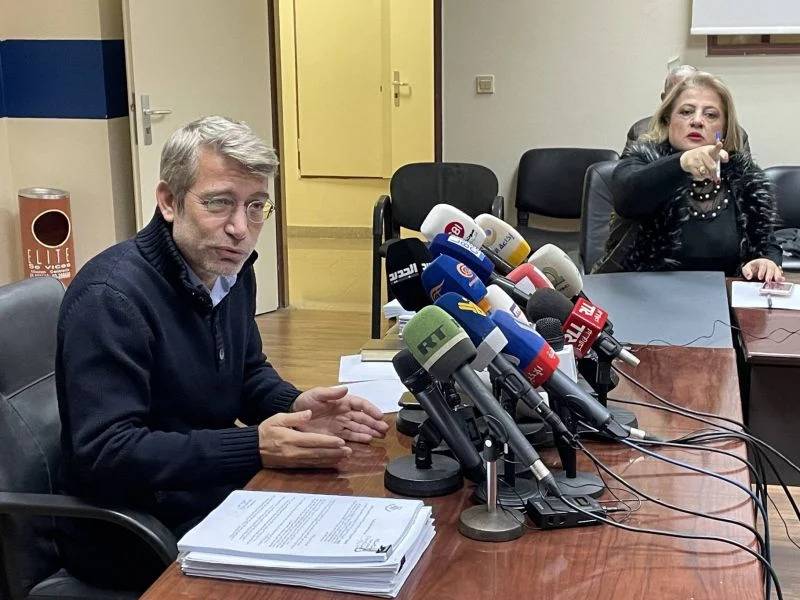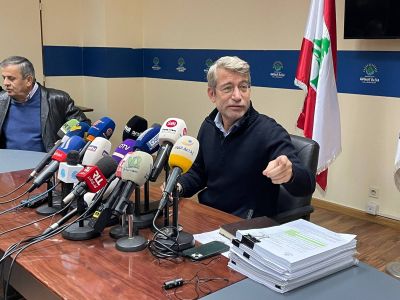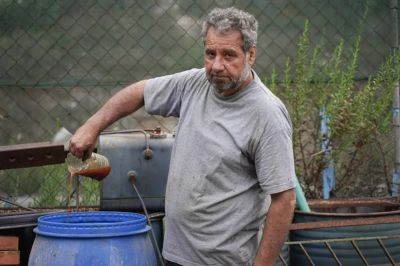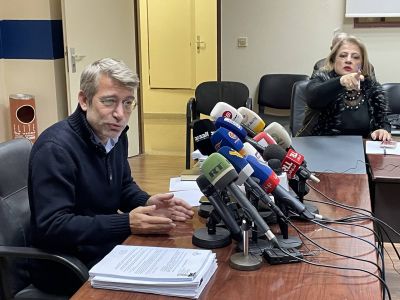
Lebanese caretaker Energy Minister Walid Fayad during a press conference on Jan. 16, 2023. (Credit: Philippe Hage Boutros/L'Orient-Le Jour_
Caretaker Energy Minister, Walid Fayad, held a press conference Monday where he presented the draft decrees meant to formalize several funding requests for the state provider, Électricité du Liban (EDL), designed to enable the latter to increase its power production by a few hours.
The money is intended to finance a transition period of a few months, after which EDL will be able to collect the amounts due through the first customer invoices calculated according to the new tariffs and thus be able to pay for its future fuel orders.
Unveiled in the fall, the new fee schedule should have replaced, starting Nov. 1, the one in force since 1994 — which was calculated on the basis of a barrel of oil costing $23. Today that barrel costs around $80. The new invoices were to start being collected in February.
But according to EDL’s press office, this timetable is no longer relevant, as production has still not been increased and is limited, at best, to a handful of hours per day, forcing many Lebanese to rely on more expensive private generators.
At his press conference, Fayad also admitted that the new tariffs could not be implemented without increasing EDL’s production first. “People would rise up, me first,” he said.
Exchange rate close to market rate
The old tariffs ranged from LL35 to LL200 per kilowatt hour, divided into several monthly consumption levels, in addition to some fixed costs. However, the real value of these tariffs is almost worthless today, given the national currency’s collapse since the start of the crisis in 2019.
Calculated in dollars, the new tariffs are already higher than the equivalent of the old prices in dollars, converted according to the longstanding official rate of LL1,507.5 against the dollar. At the time of payment, these new prices will, in addition, be converted into lira at Banque du Liban’s Sayrafa platform rate (LL38,000 to the dollar), increased by 20 percent. This would lead to a rate of LL45,600 to the dollar today for the tariffs, closer to that of the parallel market. This combination will logically contribute to higher bills, even for those customers to whom EDL is not able to supply power, as fixed costs will also be increased.
But without new tariffs — and serious bill collection — EDL will not be able to finance its fuel purchases, hence Fayad’s request for a new advance from the treasury. This money will be used to fund the gap period between the time when production is increased and when the funds from the first increased invoices are collected.
Breakdown of the requested amount
According to Fayad, he previously discussed the total amount requested with caretaker Prime Minister Najib Mikati, caretaker Finance Minister Youssef Khalil and BDL Governor Riad Salameh. The sum is part of the discussions to implement parts of the electricity emergency plan developed a year ago and adopted by the authorities in 2022. At BDL’s request, the amount requested by Fayad was reduced from $600 million to about $300 million. The decrees presented Monday by Fayad, and already signed by some members of the caretaker cabinet, break down this sum into four parts:
- The $62 million announced at the end of 2022 to pay for two diesel ships that arrived in December with a cargo of 66,000 tons of diesel, consumed by the Deir Ammar (North Lebanon) and Zahrani (South Lebanon) power plants.
- $45 million to pay for two other ships that also arrived at their destination with more than 60,000 tons of grade A and grade B fuel oil in their holds, bound for the Jiyyeh (Chouf) and Zouk Mosbeh (Kesrouan) power plants.
- The minister also requested $54 million to cover the maintenance costs of the country’s plants.
- Finally, $140 million to pay for fuel needs during the transition period, which is not expected to exceed a few months.
The disbursement of these sums, blocked by the caretaker finance minister, is at the center of a political tug-of-war between the camp of former President Michel Aoun and that of the caretaker prime minister.
Agreement with Iraq
The procedure for these decisions has divided the cabinet, causing EDL to shut down almost all of its production capacity last week due to a lack of fuel. It is also behind the blocking of offshore fuel ships, subjecting Lebanon to daily penalties that have totaled about $1 million so far as per the contract, according to the minister.
In the absence of a fully-fledged cabinet (the current one having resigned in May) and of a president (Michel Aoun’s term expired at the end of October and Parliament has not been able to elect his successor), the caretaker prime minister appears to believe that a cabinet meeting is needed to approve these files.
Meanwhile, Fayad takes a stance similar to that of Aoun’s Free Patriotic Movement, to which he is close, believing that a decree from his ministry and signed by the other ministers is enough.
Finally, Fayad said at his press conference that he expects the first delivery of fuel under the renewed agreement with Iraq to take place as early as February if the Lebanese leadership endorses the related implementing decrees as soon as possible.
This agreement was originally concluded in July 2021, for a one-year period, and consists of swapping Iraqi fuel with fuel suitable for Lebanese power plants supplied by third-party companies.
In return, Iraq is supposed to be paid in goods and services, according to a mechanism that has remained opaque. This is currently the only source of fuel for EDL.
This article was originally published in French in L'Orient-Le Jour. Translation by Joelle El Khoury.


